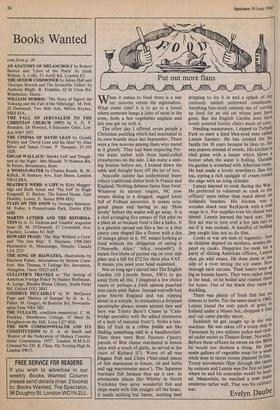Put out more flans
When it comes to food there is a war on: nouvies versus the regionalists. What sweet relief it is to go to a house where someone bangs a joint of meat in the oven, boils a few vegetables anglaise and lets you get on with it.
The other day I offered seven people a Christmas pudding which had marinated in its own brandy since last September. There were a few nouvies among them who stared at it glumly. They had been expecting Per- rier water sorbet with three hand-culled strawberries on the side. Like many a smil- ing hostess before me, I looked down the table and thought buzz off the lot of you.
Nouvelle cuisine has undermined many robust traditional dishes both in France and England. Nothing debases faster than food. Whatever its earnest origins, NC now means dining in a dragged, ragged room full of Fulham anorexics. It means octa- gonal plates and having to say `How lovely' before the waiter will go away. It is a chef arranging five smears of fish pâte on a plate ah so because food is like a haiku. It is a gherkin spread out like a fan or a thin pastry case shaped like a flower with a dot of mango gloop in it. NC means looking at food without the obligation of eating it (Wouvelle, Alice,"Alice, nouvelle'). It means five blobs of pureed veg on your side plate and a bill for £72 for three plus VAT. It means you need your head examined.
Not so long ago I darted into The English Garden (10 Lincoln Street, SW1) to get away from all this. I imagined a few choice roasts or perhaps a fresh salmon poached into curdy pink flakes. Instead nouvelle had gone Merrie England and was nipping about in a wimple. In restaurants a dropped apostrophe always means ancient fare and here was Trinity Burn't Cream (a 'Cam- bridge speciality with the added dimension of a layer of seasonal fruits'). Strike a lute. Bits of fruit in a creme brill& are like finding something odd in a handkerchief. Then there were Brye Favours ('pastry parcels of Brie cheese marinated in lemon juice with a touch of garlic, as served at the court of Richard II'). Worst of all was Elegant Fish and Chips (`bite-sized pieces of fish marinated in lemon, oil and herbs and egg mayonnaise sauce"). The Japanese marinate fish because they eat it raw. In wholesome places like Whitby in North Yorkshire they serve wonderful fish and chips made with fish straight off the boats. It needs nothing but batter, seething beef dripping to fry it in and a splash of the curiously named unbrewed condiment. Anything bite-sized reminds me of cutting up food for an old cat whose jaws have gone. But the English Garden does have lovely pointed Gothic chairs made of cane.
Needing reassurance, I zipped to Tufnell Park to meet a kind blue-eyed man called Lennie Sanders. He has cooked for his family for 30 years because he likes to. He eats prawns instead of sweets. His kitchen is tiled green with a heater which blows a hooter when the water is boiling. Outside his garden is wreathed with Albertine roses. He had made a lovely strawberry flan for tea, piping a rich squiggle of cream round the edge with an icing cylinder.
Lennie learned to cook during the War. He preferred to volunteer as cook to the officers' mess rather than stand about on Icelandic beaches. His kitchen was a wooden shack near Reykjavik with a coal range in it. For supplies even his cheese was tinned. Lennie learned the hard way. HIS first act was to turn over a hot jam tart to see if it was cooked. A handful of boiling jam taught him not to do that.
Cooks at war are men of ingenuity, Just as children depend on mothers, armies de- pend on cooks. Desperate for meat for a party of visiting American officers, Lennie shot six wild swans. He drew them at the side of a river letting the icy water flow through each carcase. Their hearts were as big as human hearts. They were rather long in the beak, so he boiled and roasted them for hours. Out of the shack they came as duckling.
There was plenty of fresh fish but no lemons or herbs. For the same meal in 1942, Lennie found the only patch of grass in Iceland under a Nissen hut, chopped it fine and out came parsley sauce. Suddenly he got caught up in the war machine. He was taken off a troop ship 111 Yarmouth by two military police and rush- ed under escort to Theatre Street, Norwich. Before three officers he swore on the Bible he would not disclose a thing. He the made gallons of vegetable soup for a week while men in secret rooms planned D-pay' Troop movements filter through the ranks by osmosis and Lennie was the first to learn where he and his comrades would be land- ed. Meanwhile, he watched a man make omelettes rather well. That was his culinary wax. Evelyn Double__














































 Previous page
Previous page